by Joe Domaleski | Sep 9, 2024 | Blog, Business, Columnists, Community, Front Page, News Center, Opinion, Top News
Math has a funny way of making many of us nervous. Even though I was a math and computer science major as an undergrad, sometimes math gives me anxiety. For some, just hearing the word “math” triggers a sense of dread, similar to how the Cold War tensions in Dr. Strangelove made the world sit on edge. Yet, much like in the film, where panic and fear were driven by misunderstanding and overreaction, our collective anxiety around math often stems from myths and misconceptions. For the purposes of this article, I’m going to use the terms math, numbers, data, and analytics somewhat interchangeably, as they are all closely interrelated. Whether we’re talking about solving equations or interpreting analytics, it all comes down to understanding and effectively using the information available to us.
“We have to stop framing mathematics as a subject that’s only for the elite few and recognize that it’s something everyone can understand and appreciate.”
-Dr. Hannah Fry, contemporary mathematician, author, and professor

Dr. Strangelove. (1964) Photo/Wikimedia Commons
The 1964 classic movie Dr. Strangelove or: How I Learned to Stop Worrying and Love the Bomb is a satirical take on the Cold War, where characters grapple with irrational fears, exaggerated threats, and an inability to deal logically with their anxieties. The central message is clear: fear itself is often the greatest enemy. Math anxiety is much the same. We magnify our fears to the point where math feels like an insurmountable challenge—when in reality, it’s simply a tool, much like numbers in our daily lives. Just as the characters in the film needed to overcome their panic to make rational decisions, we need to reframe how we view math. Instead of seeing it as something to dread, we can view it as a useful skill that opens doors to problem-solving, better decision-making, and a deeper understanding of the world around us.
Besides Fear – Different Ways People Approach Math
On the other hand, there are also those who approach math with an inflated sense of confidence, even when they’re wrong. They barrel through, convinced they have the answers, and often miss the nuance and beauty of the subject. This overconfidence can be just as dangerous as anxiety—it leads to mistakes, missed opportunities for learning, and a disregard for those who struggle. As with any skill, true understanding of math requires a blend of humility and curiosity. I’ve encountered this type of overconfidence firsthand, particularly when dealing with data and analytics. One experience that stands out took place during a presentation where I was discussing marketing effectiveness.
During that presentation, I quoted a statistic about marketing effectiveness, and before I could even finish my statement, a member of the audience blurted out that I was wrong. They claimed I had the numbers backward. I politely asked them to let me finish my thought, which included a citation of my data source. They even challenged that. I acknowledged their objection and pressed forward with the presentation. While I continued to speak, I noticed they had their phone out, clearly looking up the answer. After the presentation, I saw them trying to make a quick exit toward the door. Ironically, I ran into the same person later in the day at another local event. I politely asked if they had found the answer they were looking for. The person admitted that my citation checked out, but they still didn’t agree with my assertion and would continue looking into the situation. I’m not always right, and I’ll be the first to admit that I often transpose numbers or make errors in calculations. But some people have a hard time being wrong, and their overconfidence dissuades others from engaging. It’s okay to have some healthy skepticism, but taken to an extreme, it can become misguided overconfidence that pushes people away.
Besides the people who are overly confident or scared of math, some misuse it entirely. They tend to bend statistics or numbers to fit a false narrative. Whether it’s cherry-picking data or misrepresenting statistics to make a point, this approach is dangerous, especially in marketing, where analytics play a crucial role in decision-making. Some business owners overstate the importance of metrics, treating them like the end-all, be-all, without considering the true impact or importance of what they’re looking at. For example, sometimes the misuse is misguided, but not necessarily harmful, like in the case of “vanity metrics.” It’s very common for businesses, particularly small businesses and nonprofits, to be enamored with social media likes on specific posts without looking at more important analytics that indicate sustainable marketing effectiveness. Vanity metrics can mislead organizations into wasting resources to “beat the algorithms” in a false quest to become “viral.” Taken to an extreme, a disregard for accuracy and nuance in numbers can foster a culture where truth becomes malleable. Math, especially in the form of analytics, is meant to clarify and inform, not confuse or mislead. It’s crucial that we respect its integrity and view it as a tool to guide strategy rather than a weapon to manipulate outcomes. Always check the source of any numbers or data provided, and consider the relevant importance and merit of the message they convey.
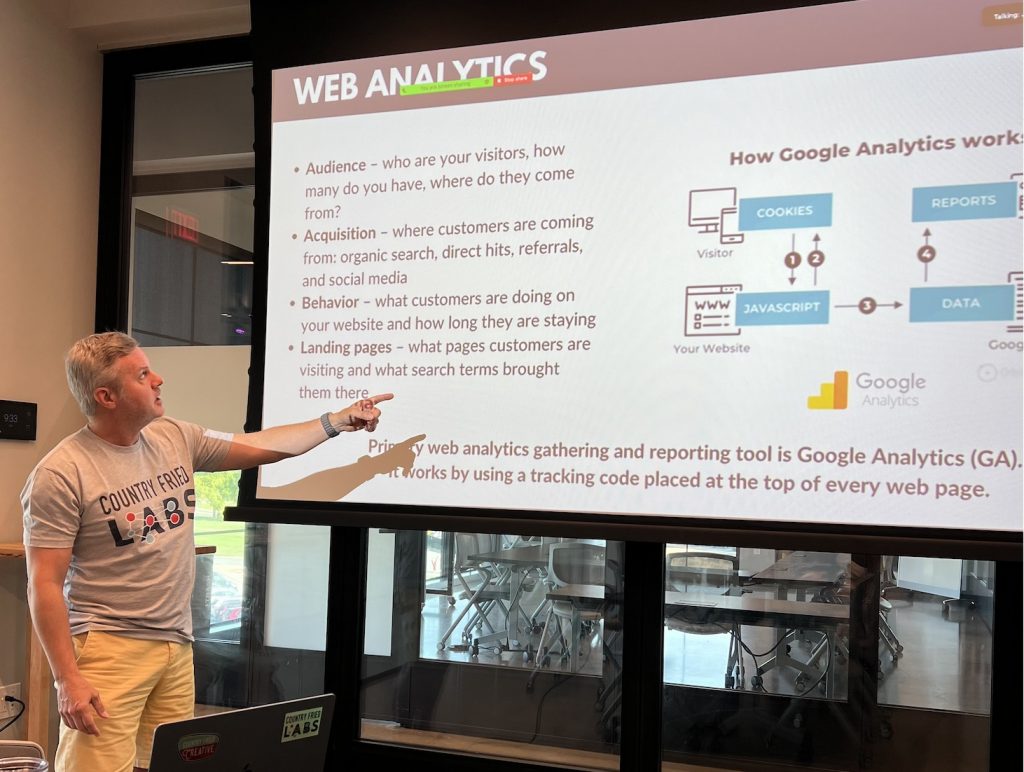
The author reviewing the basics of web traffic analytics. Photo/Hollie Holder
On the other hand, some people ignore math altogether, choosing to rely on gut instinct instead of data-driven insights. This is particularly harmful in marketing, where analytics can provide critical feedback. I can’t tell you how many excellent marketing campaigns I’ve seen cut short because the business executive refused to consider the facts and didn’t understand the difference between marketing and sales. Last summer, I was talking with one of our retail clients, who told me they were cutting their marketing budget because they didn’t feel like it was generating sales. I politely reminded them that marketing is not sales. The primary goal of marketing is promotion and awareness. All of the metrics were showing that marketing was effective—the website traffic was at record levels, and foot traffic in their retail location was as high as it had been all year. If you have a lot of people coming to your website and into your store, but they’re not buying, that’s a sales problem, not a marketing problem. The client said they didn’t care what the numbers were showing and that they were going to cut marketing anyway to focus on sales. Ignoring the data means ignoring reality and ultimately undermining long-term success. Since that time, my now former client has basically disappeared from online searches, and sales have dropped even further.
In today’s data-driven society, we face immense pressure to reduce ourselves to numbers—grades, credit scores, social media metrics, productivity stats. But while math and numbers count, people matter more. We are more than a sum of data points, and it’s time to reclaim the wonder of math as something to be explored, not feared or blindly followed. When we remove the pressure to be defined by numbers and focus instead on how math can help us understand the world around us, we open the door to a much more fulfilling relationship with it.
Why People Fear Math

Exploring the math and Python programming code behind Google’s Page Rank Algorithm during Harvard CS50’s Introduction to AI with Python online class. Photo/Joe Domaleski
Math anxiety doesn’t usually develop overnight. It’s often rooted in early experiences, where students feel pressure to perform quickly or fear judgment for wrong answers. Math is a cornerstone of education, and how it’s taught can shape a student’s entire perspective on learning. Teachers play an essential role in helping students build confidence and curiosity in math, encouraging them to approach problems with a growth mindset. When students feel supported rather than judged, math becomes less intimidating and more like a tool they can use throughout their lives. That’s why it’s critical to invest in education as a community—by supporting teachers and creating environments where students can thrive, we give future generations the chance to see math as an opportunity, not an obstacle. Much like the characters in Dr. Strangelove, who are driven by a sense of impending doom, people often feel an irrational fear toward math due to several common factors:
- Perfectionism: Many people associate math with the need for exact answers and fear making mistakes. This perfectionist mindset makes even small errors feel disastrous, leading to anxiety.
- Early Failures: Negative experiences with math in school, such as bad grades, often leave lasting impressions. These experiences create a belief that math is an innate skill, and if you’re not “good at it” early on, you never will be.
- Time Pressure: In school, math is often taught with an emphasis on speed, through timed tests or quizzes. This creates the false belief that math ability is tied to how quickly you can solve problems, causing anxiety when people feel they’re not fast enough.
- Cultural Myths: Society perpetuates the idea that some people are naturally “math people” while others are not. This discourages individuals from seeing math as a skill they can develop with effort.
- Fear of Judgment: Many adults avoid math out of fear of being judged for not having strong math skills, particularly in areas like finances or workplace calculations, which can lead to embarrassment.
In Dr. Strangelove, General Ripper famously says, “War is too important to be left to the politicians.” In the same way, math is too important to be left to fear. Numbers play a big part in everything we do—from managing our money and health to navigating today’s data-driven economy. Every day, decisions get made based on numbers, whether it’s in business, healthcare, or public policy. But too often, math anxiety stops people from embracing how useful numbers can be. Math is practical; it helps solve real-world problems, make better choices, and understand how things work. Whether you’re working on your budget, growing your business, or making decisions about your health, math has a role to play. When we avoid it, we’re passing up opportunities to improve our lives. It’s time to stop treating math like something to fear and start seeing it as a tool that can make a real difference.
Overcoming the Fear of Math
Just as the characters in Dr. Strangelove needed to abandon their irrational fears and adopt a more logical mindset, adults can learn to reframe their relationship with math. The good news is, it’s easier than you think to make small changes that can dramatically reduce math anxiety. Often, the fear of math is tied more to our perception of it than the actual complexity of the subject itself. By making simple adjustments—such as shifting our mindset or starting with basic tasks—we can change the way we approach math and build confidence along the way. Math doesn’t have to be intimidating or stressful. In fact, with the right approach, it can become a useful and even enjoyable part of your daily routine. Here are some practical strategies to start overcoming math anxiety:

Keeping my brain sharp by using a little calculus and linear algebra to solve ordinary differential equations for the SFI Nonlinear Dynamics course. Photo/Joe Domaleski
- Shift Your Mindset: Recognize that mistakes are part of learning. Math isn’t about getting everything right on the first try; it’s about working through problems and learning from the process. Just like in Dr. Strangelove, where the characters fail by holding onto fear, we must acknowledge that math success is about persistence, not perfection.
- Start Small and Slow Down: If you feel overwhelmed by math, begin with small, manageable tasks and take your time. There’s no rush. One of the biggest causes of math anxiety is the pressure to work fast. Slow down and give yourself the space to really understand what you’re doing. Try applying simple math in everyday scenarios, like budgeting or cooking, to ease your way back into it without feeling overwhelmed.
- Get Curious: Instead of focusing on math’s difficulty, allow yourself to be curious. Ask why certain rules or analytics work the way they do. In Dr. Strangelove, the absurdity unfolds because the characters fail to ask the right questions. Curiosity leads to understanding, and that understanding can unlock a greater sense of control over numbers.
- Find Real-Life Applications: Math becomes much less intimidating when it’s tied to practical, real-world situations. Whether you’re calculating a tip at a restaurant or setting financial goals, applying math to daily life makes it more relatable and helps dissolve the abstract fear surrounding it.
- Embrace Lifelong Learning: It’s never too late to learn math. I’m studying advanced math right now in middle age. Many adults think their window for learning has closed, but that’s far from the truth. Much like the characters in Dr. Strangelove, who cling to outdated thinking, overcoming math anxiety requires being open to learning at any stage of life. The willingness to grow and adapt is key.
Loving the Math
In Dr. Strangelove, the fear of nuclear annihilation is portrayed as absurdly overblown, just as math anxiety is often exaggerated in our minds. We tend to make math seem more intimidating than it really is. But when we stop worrying about being perfect and start embracing math as a manageable, even enjoyable challenge, we learn to “love the math.” Math is a tool, not a test of our intelligence or worth. Ignore people who say or act otherwise. “Math bullies” are often masking some other form of insecurity. By shifting our focus from getting everything right to simply understanding how math works, we can unlock opportunities both personally and professionally.
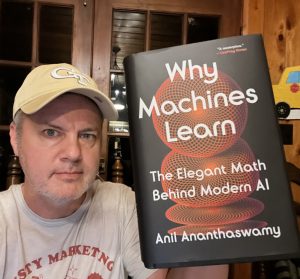
Why Machines Learn – The Elegant Math Behind Modern AI by Anil Ananthaswamy is a new book that explains the importance of math in modern AI. Photo/Joe Domaleski
The key is changing how we approach it. Math doesn’t have to be something we rush through or stress over. Slowing down and taking time to truly understand the numbers makes a huge difference. When we approach math with curiosity, it stops feeling abstract and starts becoming more practical. Simple tasks like budgeting, measuring for a recipe, or tracking progress toward a goal show us that math is a part of everyday life. It’s less about solving everything perfectly and more about applying what we know to real-world situations at home or work.
We often turn math into a battle in our own minds, but it doesn’t have to be that way. As President Merkin Muffley famously says in Dr. Strangelove, “Gentlemen, you can’t fight in here! This is the War Room!” Similarly, there’s no need to fight math. When we stop seeing it as something to conquer and start treating it as a tool to solve problems, it becomes far less intimidating. With the right mindset and a little patience, math can actually make things easier. It’s about progress, not perfection. When we let go of the fear and approach math with a willingness to learn, we can stop worrying and start using math to improve our lives.
Final Thoughts
You don’t have to become a math genius to overcome math anxiety. Yes, there will always be people who can do math calculations in their head that you can’t do, much like an athlete might be able to accomplish an athletic feat you can’t do. That’s okay and normal. Learning to reduce anxiety and love numbers is about taking small, steady steps to change the way you think about math. Instead of seeing it as something to fear or rush through, math can be approached with curiosity and patience. By starting small, slowing down, and applying math to real-life situations, you can build confidence over time. You probably won’t get everything right the first time and that’s fine. Reducing the fear of math is about progress and persistence. When we embrace math as a tool for problem-solving, rather than something to be afraid of, we unlock its potential to make our lives easier.
Give yourself the space to learn and explore—you might just find that you can, in fact, learn to love the math. So, what’s one small change you can make today to improve your relationship with math? It could be something as simple as calculating the tip at dinner without using your phone, setting up a basic budget for the week, or trying out a math puzzle or app in a low-pressure environment. These small, real-life steps can help you rebuild your confidence and shift your mindset toward seeing math as a useful skill, not a source of stress.
[Joe Domaleski, a Fayette County resident for 25+ years, is the owner of Country Fried Creative – an award-winning digital marketing agency located in Peachtree City. His company was the Fayette Chamber’s 2021 Small Business of the Year. Joe is a husband, father of three grown children, and proud Army veteran. He has an MBA from Georgia State University and enjoys sharing his perspectives drawing from thirty years of business leadership experience. Joe is a recipient of the Peachtree City Rotary Club Business Leader of the Year Award for 2024. Sign up for the Country Fried Creative newsletter to get marketing and business articles directly in your inbox. You can connect with Joe directly on LinkedIn or follow his new blog Marketing Data Science for more insights and updates.]
by Joe Domaleski | Sep 2, 2024 | Blog, Business, Columnists, Community, Front Page, News Center, Opinion, Top News
This past weekend, my wife, Mary Catherine, and I enjoyed a staycation up in Atlanta, high atop the 65th floor of the Westin Peachtree Plaza hotel. For some, Labor Day weekend means football. For others, it means time at the lake in front of a grill. For us, it means Dragon Con! I think every Atlantan needs to attend Dragon Con at least once, but for us, it’s a regular ritual. In fact, Dragon Con neatly coincides with our wedding anniversary in a few weeks. What better way to celebrate love than at Dragon Con, right ladies?

The view looking south from our Dragon Con hotel room on the 65th floor of the Westin Peachtree Plaza. Photo/Joe Domaleski
So what is it? Dragon Con is a large multi-genre convention held annually in Atlanta, Georgia, during Labor Day weekend and takes over most of the downtown Atlanta hotel district. It began in 1987, has grown to over 70,000 attendees, and has become one of the largest pop culture conventions in the United States. Dragon Con covers a wide range of genres, including science fiction, fantasy, gaming, comics, literature, art, music, and film. Events include costuming, panels, celebrities, art shows, live events, dealer halls, and the annual Saturday morning parade down Peachtree Street. We’ve been going since 2004, when our kids were little. Even though they’re all grown and out of the house, we still like to attend.
Attending Dragon Con is like going back home and being surrounded by a sea of fellow fans, cosplayers, and pop culture enthusiasts. As a member of Generation X, I grew up on Star Trek, Star Wars, and arcade games. All of that and more happens at Dragon Con. Events take place pretty much 24 hours a day during the five official days of the convention. As middle-aged attendees, we didn’t quite have the stamina to attend the all-night parties, but we still made the most of our time (and energy levels). There’s something really magical about being with so many people with diverse interests that share a common goal of having fun. It turns out, Dragon Con is more than just a weekend escape. Dragon Con is an example that play, creativity, and having a good time are just as important now as they were when we were kids. Let’s explore the importance of all that from a middle-aged geek’s perspective.
Rediscovering the Fun in Play
One of the first things that impresses me at Dragon Con is the sheer joy of it all. Everywhere you look, there are people having fun and playing. From the elaborate costumes to the random dance-offs in the hotel lobbies, everyone is having a great time. For those of us juggling work, family, and life’s never-ending to-do list, play often feels like something we simply don’t have time to enjoy. But being at Dragon Con reminds me that play isn’t just for kids. Fun and play are necessary parts of life, no matter how many candles were on your last birthday cake.
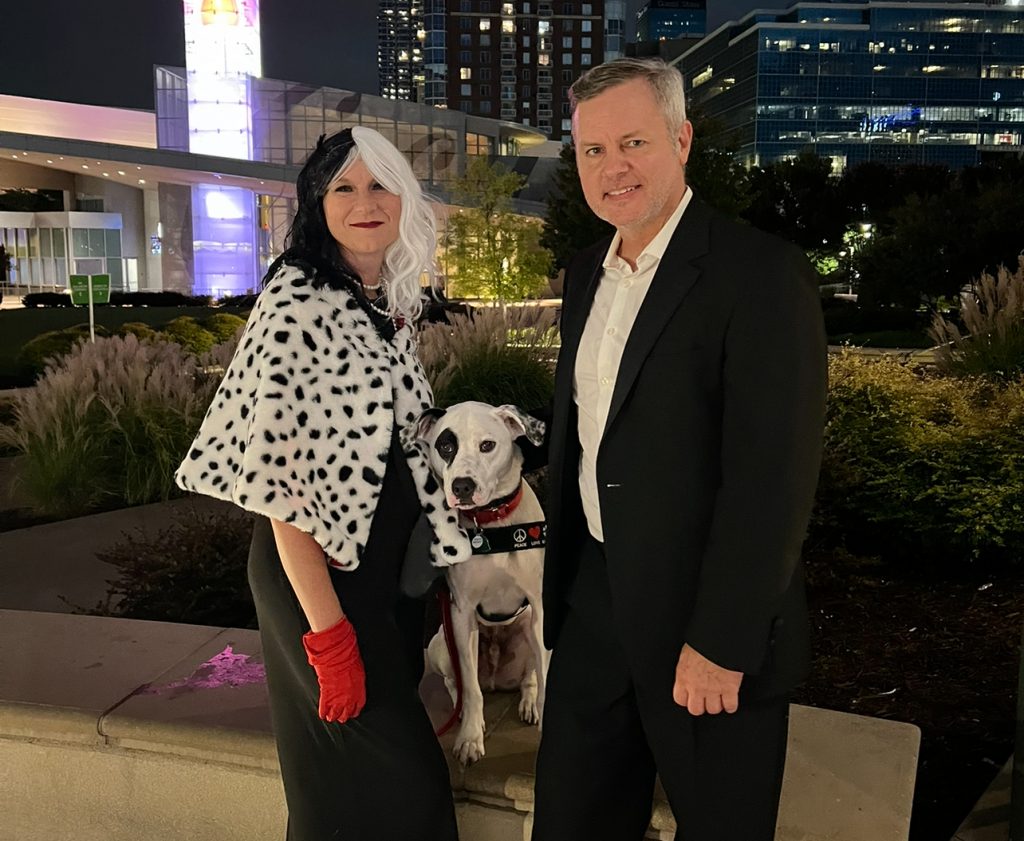
My wife Mary Catherine as Cruella de Vil with our dog Loki and me in front of the Georgia Aquarium at Dragon Con 2024. Photo/Joe Domaleski
At Dragon Con, play is the name of the game. Whether you’re dressing up as your favorite character or just people-watching, you’re encouraged to let loose and have fun. And this kind of play isn’t just about blowing off steam; it’s about recharging your batteries and reconnecting with that part of yourself that still knows how to be carefree. Trust me, that’s something we all need more of—including me.
Creativity: It Doesn’t Get Old
Another thing Dragon Con reminds me of is that creativity doesn’t have an expiration date. Walking around, I was blown away by the sheer talent on display—from the meticulously crafted costumes to the original artwork and fan fiction. It’s proof that creativity doesn’t fade with age; if anything, it gets richer.
As we get older, our creative outlets might change, but that doesn’t mean we stop being creative. Whether you’re writing, building, designing, or just appreciating the work of others, Dragon Con shows us that there’s no age limit on imagination. Engaging in creative activities—especially in a place as inspiring as Dragon Con—can reignite passions we may have put on the back burner and remind us that it’s never too late to create something new.
Finding Your Tribe
One of the things I love most about Dragon Con is the sense of community. People from all walks of life come together, united by their shared love for a particular show, book, or game. It’s a very tangible reminder that no matter how different we may seem, there’s always something that can bring us together.

Celebrating our 30th Wedding Anniversary during Dragon Con with a dinner at the iconic Polaris Restaurant and Lounge high atop the Hyatt Regency Atlanta. Photo/Joe Domaleski
For those of us who’ve been around the block a few times, this sense of community can be a load of fun. Oftentimes, when I’m with groups of people in the local community, there’s a lot of networking going on—people are either asking me questions and trying to meet me for business purposes, or I’m doing the same thing. Don’t get me wrong, I love our community and enjoy networking, but sometimes it’s fun to be with people without a specific goal in mind. Events like Dragon Con show us that we’re part of something bigger—a network of people who get it, who share our interests and passions. Connecting with others who share our enthusiasm can be incredibly validating and up-lifting.
Learning New Things
Over the years, Dragon Con has become much more than just a gathering for science fiction and fantasy enthusiasts. The convention has expanded to offer a wide array of tracks that delve into science fact, providing attendees with opportunities to explore topics involving technology, robotics, astronomy, physics, and more. These tracks attract experts from various fields, including leading researchers, academics, and industry professionals, who share their knowledge and insights through panels, workshops, and discussions. Whether you’re a seasoned professional or just curious about these subjects, Dragon Con offers a unique platform to engage with complex scientific concepts in an accessible and often entertaining way. What’s really fun is that many of these experts are also fellow geeks and dress up in costumes. Often they’ll make points by using pop cultural references, which makes the learning fun.

Hampocalypse – amateur (ham) radio panel at Dragon Con 2024. I was the moderator (far right seated at the table) and Mary Catherine was also a panelist (second from the left). Photo/Jonathan Sarge
During this past weekend, I had the privilege of participating in a panel discussion on Artificial Intelligence with a group of PhD researchers and academics. The discussion was not only enlightening but also highlighted the real-world implications and ethical considerations of AI. The panel featured researchers who talked about AI in robotics, drug trials, physics, and even marketing data science (my favorite topic). On Saturday, I had the opportunity to moderate a panel on amateur (ham) radio, cleverly titled “Hampocalypse.” This session focused on the equipment and methods used to communicate in post-apocalyptic disaster scenarios—a topic that blends practical knowledge with a bit of speculative fun. The discussion covered everything from the basics of setting up a ham radio station to more advanced topics like emergency preparedness and survival communication strategies. These experiences at Dragon Con help foster learning and dialogue across a wide spectrum of interests that caters to both the imagination and the intellect.
Why Leaders Should Take Play Seriously
As someone who’s juggling a few different roles—family man, professional, teacher, student, community leader—I’ve thought a lot about the role of play in leadership. Dragon Con reinforced what I’ve long believed: that play isn’t just a break from the serious stuff; it’s an integral part of it. For leaders, engaging in playful activities can spark new ideas, boost creativity, and build stronger, more cohesive teams. Creative people need playtime regardless of their age.

Mary Catherine sitting along Peachtree Street at the Dragon Con parade with our dog Loki. He’s wearing his Demogorgon Dog costume from the TV show Stranger Things. Photo/Joe Domaleski
Taking time to play, whether at an event like Dragon Con or in smaller, everyday ways, can make us better leaders. It opens our minds to new possibilities, reduces stress, and helps us approach challenges with a fresh perspective. It’s also a chance to pursue interests with no specific goal or aim other than to have fun. Within reason, it’s also a chance to enjoy things and not care what anybody else thinks. As we grow older, it’s easy to fall into the trap of thinking that play is for kids, but that couldn’t be further from the truth. Play is for everyone, and it’s especially important for those of us who tend to take life too seriously or think everything has to be in furtherance of a goal.
Conclusion: Embracing Your Inner Geek
Seeing everyone at Dragon Con reminded me that we all have a bit of geek in us, no matter our age or interests. Embracing that geek, indulging in play, and nurturing our creativity is a vital part of living a balanced, fulfilling life. Whether you’re a lifelong fan or just dipping your toes into the world of fandom, Dragon Con offers a chance to step outside the everyday and into a world where imagination is celebrated.
Here’s to all the geeks out there, especially those of us who’ve been around the block a few times. We know that life becomes richer and more meaningful when we make time to play. Whether it’s attending conventions, crafting costumes, or just enjoying your favorite sci-fi show, it’s important to remember that fun isn’t just for kids—it’s for everyone. And now that Labor Day has passed, Halloween is right around the corner. Have you thought about what you’ll dress up as this year?
[Joe Domaleski, a Fayette County resident for 25+ years, is the owner of Country Fried Creative – an award-winning digital marketing agency located in Peachtree City. His company was the Fayette Chamber’s 2021 Small Business of the Year. Joe is a husband, father of three grown children, and proud Army veteran. He has an MBA from Georgia State University and enjoys sharing his perspectives drawing from thirty years of business leadership experience. Joe is a recipient of the Peachtree City Rotary Club Business Leader of the Year Award for 2024. Sign up for the Country Fried Creative newsletter to get marketing and business articles directly in your inbox. You can connect with Joe directly on LinkedIn or follow his new blog Marketing Data Science for more insights and updates.]
by Joe Domaleski | Aug 26, 2024 | Blog, Business, Columnists, Community, Front Page, News Center, Opinion, Top News
Thank you readers. Believe it or not, this is my 100th column for this newspaper! Over the past two years, I’ve really enjoyed sharing personal insights, stories, business tips, and even the occasional ramble with you. A lot of work goes into each article—more than I suspected when I first started. But as I look back over the experience, I can honestly say it’s been worth it. Writing has helped me learn more about myself and the topics I’ve covered. It’s one thing to think about things; it’s another to articulate those thoughts in writing.
When Cal Beverly encouraged me to start this column in the late summer of 2022, I was a little apprehensive. Do you remember my first column about why I started a local business? A full slate of seasoned columnists were already writing, and I wasn’t sure what I would write about or how I would fit in. They had a loyal following, and it wasn’t clear what I could offer. Frankly, I kinda decided what I didn’t want to write more than I knew what I wanted to talk about. I think it’s clear by now that I have avoided making commentary about local or national politics. It’s not that I don’t care (I do), but politics isn’t my jam.
While I believe in free speech, it hasn’t been easy being associated with others who exercise that right so vigorously. I’ve been criticized by people on both the left and the right who’ve asked me to take a stand on various issues. Most of the criticism has been minor and hasn’t appeared in this paper. Again, politics is not my thing, so I’ve just tried to avoid such topics. Regardless of what you may personally believe, I will say that Cal Beverly has never once censored anything I’ve written or asked me to write for or against any particular topic. I’ve had free rein to write about what I wanted. Thank you for that, Cal.
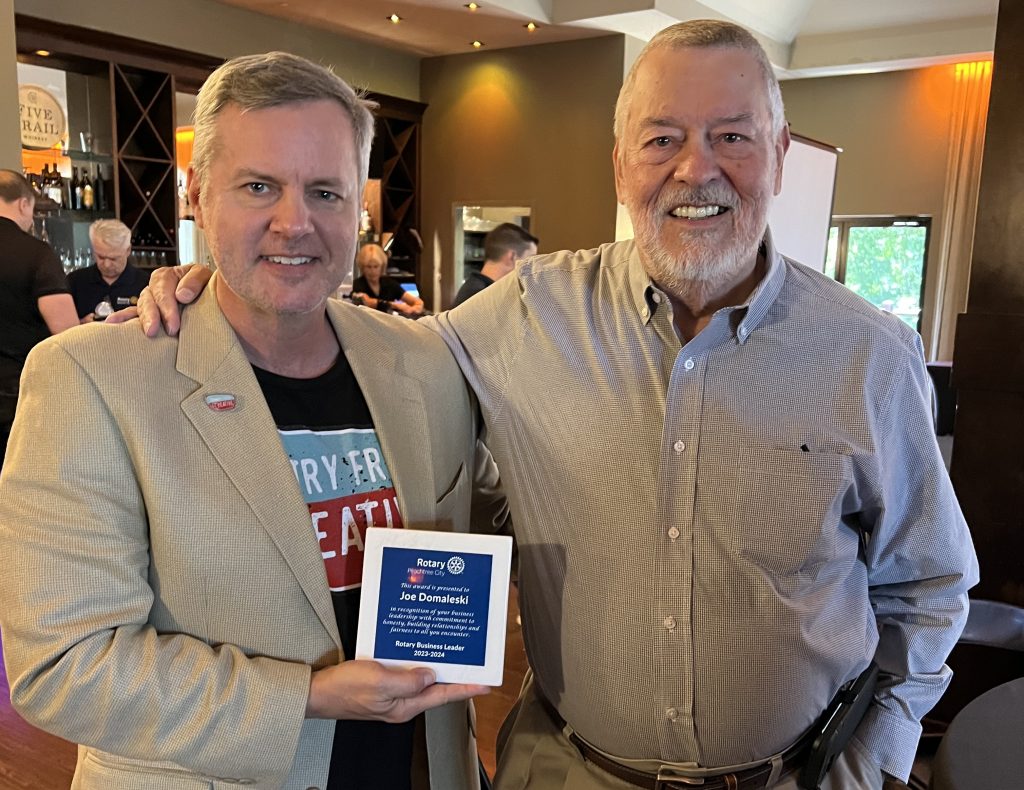
Joe Domaleski with Cal Beverly during a meeting of the Peachtree City Rotary Club. Photo/Ellie White-Stevens
Over the past few months, the view count from your readership has made this column one of the more popular features on the newspaper’s website. Although I don’t do it for the numbers (this is an unpaid gig for me), it is gratifying to know that some of you find value in it. What I really enjoy is when people see me in public and talk to me about some of the things I’ve written. Unlike some writers, I am pretty active in the local community and don’t hide behind a computer screen.
Today, I have some exciting news to share. Over the past year, my most popular columns have been about topics related to artificial intelligence (AI), analytics, marketing, and higher education. Indeed, I had no idea that my announcement about going back to school for another degree at Georgia Tech would be of interest to so many of you. Thank you for that support and encouragement. To delve deeper into those subjects and more, I’ve decided to start a new blog called Marketing Data Science with Joe Domaleski.
Several close friends encouraged me to start the new blog, and I just published my first post over the weekend. The blog will be hosted on the Medium.com platform. This new platform will allow me to explore the latest developments in data science and artificial intelligence, particularly how they apply to marketing and small business strategies. While these topics might seem complex, I aim to break them down into digestible insights that can help local businesses and nonprofits, just like yours, thrive in today’s digital age.
But don’t worry—I’m not going anywhere! As long as Cal will have me, I’ll continue writing here in the newspaper, bringing you the same blend of business insights and personal reflections you’ve come to expect. The new blog is simply an extension of my thoughts, providing a space to dive deeper into the fascinating world of data-inspired marketing. I also intend to chronicle my journey as a middle-aged graduate student on the new blog, which could prove to be very interesting.
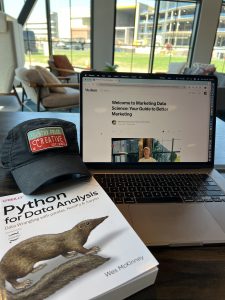
Previewing my new blog Marketing Data Science from our remote office at Trilith. Photo/Joe Domaleski
I hope you’ll follow me on the new blog and please tell friends and work colleagues about it. It’s a non-monetized blog, so I’m going to rely on old-fashioned word-of-mouth marketing, which is still very relevant despite algorithmic marketing techniques.
My new blog is located at: https://blog.marketingdatascience.ai.
Please keep reading this newspaper website as well. I’ll still be right here, sharing stories that I hope you’ll continue to enjoy reading. Thank you for being part of my journey as a writer and blogger. Here’s to the next 100 columns—and beyond!
[Joe Domaleski, a Fayette County resident for 25+ years, is the owner of Country Fried Creative – an award-winning digital marketing agency located in Peachtree City. His company was the Fayette Chamber’s 2021 Small Business of the Year. Joe is a husband, father of three grown children, and proud Army veteran. He has an MBA from Georgia State University and enjoys sharing his perspectives drawing from thirty years of business leadership experience. Joe is a recipient of the Peachtree City Rotary Club Business Leader of the Year Award for 2024. Sign up for the Country Fried Creative newsletter to get marketing and business articles directly in your inbox. You can connect with Joe directly on LinkedIn or follow his new blog Marketing Data Science for more insights and updates.]
by Joe Domaleski | Aug 19, 2024 | Blog, Business, Columnists, Community, Front Page, News Center, Opinion, Top News
Are you a dog lover? Most people are, and even if you’re not, most dogs love humans regardless of how you feel about them. The bond between humans and dogs is a special one, unlike anything else in the natural world. Dogs have an innate ability to understand and respond to our emotions, offering comfort in times of distress and sharing in our joy during moments of happiness. Not to take away from human relationships, but dogs exemplify unconditional love. This special bond was at the heart of our decision to welcome a new dog into our lives and train him as a therapy dog. Here’s the story of Loki, our new therapy dog.
Last spring, we were at McCurry Park on the east side of Fayetteville. I was spectating and cheering on the Fayette County Fire Department at the baseball portion of the Public Safety Games. My wife, Mary Catherine, was at the Fayette Parks & Recreation Dog Days of Summer event happening in the park at the same time. After watching Fayette County Fire beat Peachtree City in the finals, I climbed the hill up to the football practice area where the Dog Days event was taking place. Here’s a picture of what I saw.

Mary Catherine Domaleski with Loki on his gotcha day last spring. It seemed appropriate to get his picture in front of the Fayette County fire safety bus. Photo/Joe Domaleski
Once I saw Mary Catherine with the dog, I somehow knew he was coming home with us (even though we weren’t really looking to adopt). We already have an older dog at home named Thor. He’s been a great dog, but he’s starting to slow down. Like me, he has a little arthritis. Maybe Thor needed a buddy? Originally named Lucky, we decided to rename the new dog Loki to complement our existing dog Thor. The names Lucky and Loki sound so similar that Loki (as we now called him) responded immediately to his rebranding.
As dog lovers, we both immediately fell in love with Loki, a spirited and affectionate rescue dog. We had to sign some papers with Bully Wag, the adoption agency, and have a trial period to make sure it was going to be a good fit for us, Thor, and Loki. Gone are the days when you can just pick up “pound puppies” and take them home. Most pet support organizations have a trial period so that there’s a long-term relationship, which cuts down on pet abandonment. After the trial period, more paperwork, and a trip to the vet, Loki became a permanent member of our family.
Loki has become an integral part of our lives, not just as a beloved pet but also as a loving therapy dog. With the expert guidance of a local dog trainer, we (mostly Mary Catherine) diligently trained Loki, and we couldn’t be prouder of the progress he’s made. I won’t go into details about the process, but it wasn’t easy. He had to pass a rigorous behavior test and several practicums in public places and at nursing homes. A local field examiner for the Alliance of Therapy Dogs (ATD) and the American Kennel Club (AKC) did a great job administering the tests and certifying Loki.
During this process, I learned about the difference between service dogs and therapy dogs. Here’s the difference:

Mary Catherine Domaleski holding the American Kennel Club certification ribbons earned by Loki the therapy dog. Photo/Joe Domaleski
Service Dogs are specially trained to assist individuals with disabilities. They perform specific tasks that help their owners manage their daily lives, such as guiding the visually impaired, alerting the deaf, or providing support for those with mobility issues. Service dogs have legal access to public spaces to support their owners.
Therapy Dogs, like Loki, are trained to provide comfort and emotional support to a wide range of people, often in settings such as hospitals, schools, and nursing homes. They do not have the same access rights as service dogs and are always accompanied by their handler during visits. Therapy dogs are primarily there to bring joy, reduce stress, and improve overall well-being.
So, we decided to go the therapy dog route for two main reasons. First, and most obvious, is that Loki has a very gentle and calm nature. From the moment we met Loki, it was clear that he had a natural disposition for providing comfort. His gentle demeanor, combined with his ability to stay calm in various situations, made him an ideal candidate for therapy work.
Secondly, it’s our desire to help others in the community. While a service dog typically serves the need of a single human, therapy dogs provide support for groups of people. We saw an opportunity to contribute positively to the lives of others, particularly those in need of emotional support. As I mentioned earlier, there’s something magical and uplifting about the bond between humans and dogs. We wanted to share the joy Loki brings to us with others, especially in settings like hospitals, schools, and nursing homes, where his presence could brighten someone’s day. He also brightens our day at home.
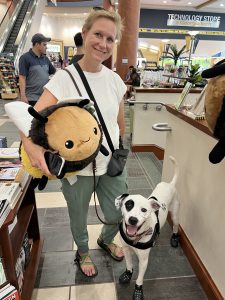
Mary Catherine and Loki inside the Georgia Tech bookstore last weekend welcoming students, including the author, back to school. The bookstore is dog friendly if you get permission. Photo/Joe Domaleski
We’ve been amazed at how well Loki has been received in the community, especially by children. People seem naturally drawn to his “eye patch.” Older folks, like us, see him and remember Petey the dog from The Little Rascals TV show. Younger folks think of the Target dog. Loki loves people. It’s our hope that Loki’s work as a therapy dog can help build stronger community ties. His visits with students, seniors, first responders, and people in the community can bring people together, fostering a spirit of care and togetherness.
Since Loki can’t be everywhere at once, we decided to share his love virtually through Instagram. Need a quick pick-me-up of good vibes? You can like, share, comment, and follow Loki’s Instagram account at:
https://instagram.com/lokitherapydog
So next time you see us out and about in the community, don’t be surprised if you hear us say, “Looky, it’s Loki!”—our new therapy dog. We hope you’ll stop and say “hello.” Loki looks forward to seeing you and brightening up your day.
[Joe Domaleski, a Fayette County resident for 25+ years, is the owner of Country Fried Creative – an award-winning digital marketing agency located in Peachtree City. His company was the Fayette Chamber’s 2021 Small Business of the Year. Joe is a husband, father of three grown children, and proud Army veteran. He has an MBA from Georgia State University and enjoys sharing his perspectives drawing from thirty years of business leadership experience. Joe is a recipient of the Peachtree City Rotary Club Business Leader of the Year Award for 2024. Sign up for the Country Fried Creative newsletter to get marketing and business articles directly in your inbox. You can connect with Joe directly on LinkedIn for more insights and updates.]
by Joe Domaleski | Aug 12, 2024 | Blog, Business, Columnists, Community, News Center, Opinion, Top News
It’s time for me to go back to school. After a three-decade hiatus from academia, I’m excited (and a little nervous) to announce that I’ve been accepted into Georgia Tech’s Master of Science in Analytics program, with classes beginning next week (as I write this in August 2024). It’s been a long time since I last sat at a desk in graduate school, having earned my MBA from Georgia State University (GSU) back in 1993. Yes, I’m going to be a working student—running my marketing agency full-time while also attending graduate school. I was a working student before in the ’90s, and we’ll see if I can do it again.
A lot has changed in the academic world since then—the Internet, online learning, faster computers, new degree programs and fields of study, and pervasive technology like the iPhone. See my previous article about my 45-year love affair with Science, Technology, Engineering, and Math (STEM). Despite all the changes, one thing remains constant: my passion for learning and my desire to grow both personally and professionally.
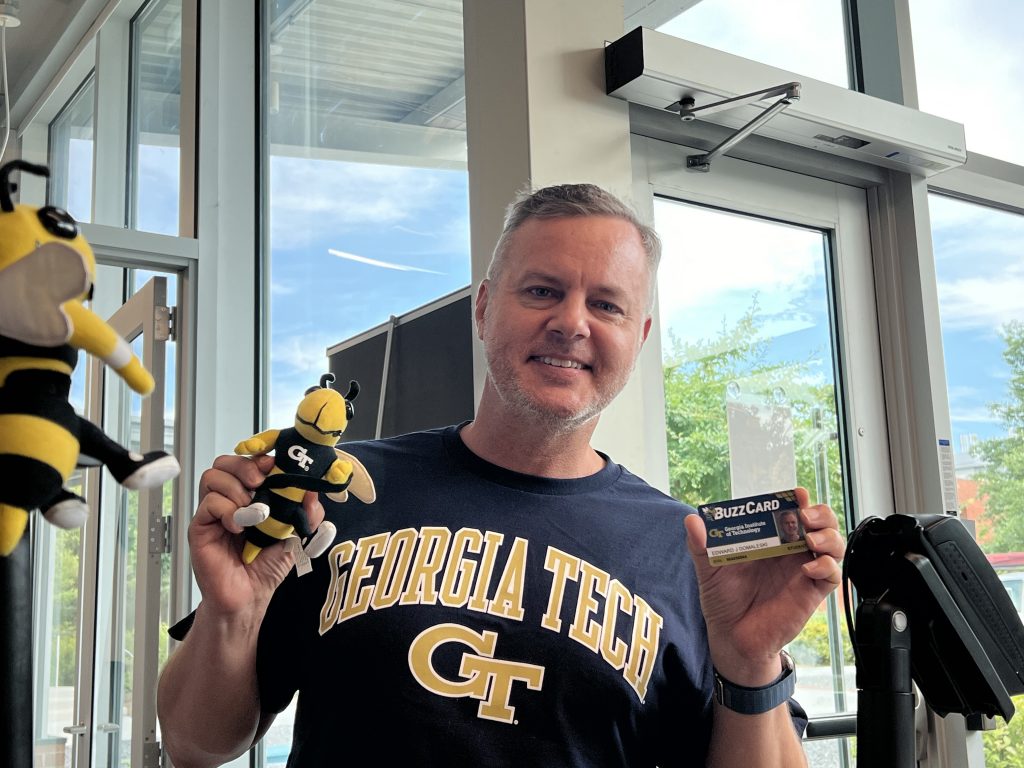
The author as a new Georgia Tech student holding his Buzz Card student ID. Photo/Joe Domaleski
A few years ago, my wife Mary Catherine decided to go back to college and finish her bachelor’s degree at Clayton State University. She put aside her studies in 1994 so that we could get married and raise children. With our kids grown and an empty nest at home, she re-enrolled in college. I really admired how hard she worked and the excitement she felt finally completing her bachelor’s degree (even though the commencement had to be virtual due to COVID).
Seeing how much she enjoyed the experience, I thought about pursuing some of my own unfinished academic business. Last year, I began the process of “getting up to speed” on various degree programs and fields of study. I started taking some non-credit online courses to see what that was like, and I really enjoyed it. At the beginning of this year, I decided to take some concrete steps to re-enter the academic world.
Thank you, Dr. Alvetta Thomas, Dr. Tim Hynes, Mrs. Carlotta Ungaro, Dr. Jacob Chacko, Dr. Sam Khosravi, and Dr. Charles Davis, for the encouragement and support. Thank you to Dr. Joie Hain (CSU) and Mr. Matt Bramblett (GSU) for giving me the opportunity to be a guest lecturer in your business and marketing classes this year. Doing that really increased my excitement about pursuing further academic dreams. Thanks also to my younger brother, Dr. Chris Domaleski, who pursued his academic dreams years ago and encouraged me to finally follow through on mine. With all that awesome support, I decided to apply to Georgia Tech last spring.
Even though a lot has changed on college campuses, the admissions process has not. I had to submit letters of recommendation, send college transcripts, and complete lots of digital paperwork. I will say that the Georgia Tech graduate admissions office did an excellent job guiding me through the complex process. One thing I didn’t have to do was take another standardized test, nor did I have to submit a FAFSA form for myself (thank goodness).
I nervously waited all spring to see if I had been accepted. That nervousness was compounded by seeing all the social media posts about my friends’ children being accepted to various colleges. On May 10, 2024, I received my acceptance letter from Georgia Tech. I don’t mind telling you I got a little misty-eyed with excitement about that letter. My “love language” is Words of Affirmation. That letter was big-time affirmation.
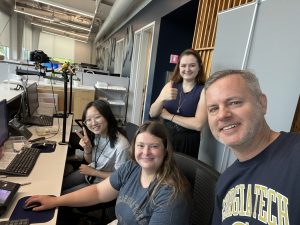
GT students working in the Buzz Card office pose for a selfie with the author. Photo/Joe Domaleski
Last week, I went up to Georgia Tech to get my student ID, aka the “Buzz Card.” When I went into the ID office, I told the young lady that I was there to pick up a student ID. She asked me, “What’s your student’s name?” thinking that I must have been a parent picking up for their kid. I replied, “Domaleski, that’s my last name, and the ID is for me. I’m going back to college.” All the kids in the office cheered. The girl at the desk said, “Congratulations on the acceptance, Mr. Domaleski. We love our non-traditional, senior students.” Did you ever see the Rodney Dangerfield movie Back to School from the ’80s? If you saw the movie, you know how I feel (although I don’t have enough money to endow a business college like he did in the movie).
So why did I decide to go back to college and get another master’s degree? There are three main reasons I’m doing this:
To Learn More About Data Science, Analytics, and AI to Better Help My Clients
In the years since earning my MBA, I’ve enjoyed a thirty-year career helping businesses and nonprofit organizations with their marketing. Even though my career started out focused more on technology, my focus shifted more to marketing, sales, and strategy in the last twenty years of my career. That’s a pretty common career trajectory for a middle-aged executive like me. However, as the landscape continues to evolve, so too must my skills. The growth and importance of data science, analytics, and artificial intelligence (AI) have created new opportunities—and challenges—that I’m eager to tackle.
Even though I’ve tried to keep current with everything, I feel like it’s time to see what the academic world has to say about these topics. Not everyone agrees, but I’ve always found that an effective leader of something must also have the ability to be a practitioner of whatever skill or topic they’re leading. When I was in the Army, everyone had to carry a weapon and know how to use it. In like manner, I need to broaden my expertise in these new tools of business. It’s important to ensure that the strategies I recommend are grounded in the latest technological advancements.

The author in front of the iconic Tech Tower. Photo/Vinay Revanuru
So why another master’s degree and not a PhD? Several reasons, actually. First, I’m not a young man anymore. It requires a lot of time and energy to get a terminal degree. I need to make sure this is something I’m really committed to doing. Also, I don’t think I’d be successful in a modern PhD program without freshening up my academic credentials, especially in the areas of math and data science. Yes, I know more about those topics than many of my peer business executives—but not enough to get a doctorate. Regardless of degree program, most graduate programs are heavy on quantitative skills, and I’m eager to catch up to what’s new. A lot has happened in 30 years. Assuming I complete my MS program, I can decide later whether or not to keep going with more studies.
To Expand My Personal Network Within the Georgia Tech Community
When I graduated from high school back in 1985, I applied and got accepted to several universities, including Georgia Tech. Many of my friends went to Tech, and I almost did as well. In the spring of 1985, I ultimately decided to accept a Georgia Military Scholarship to attend North Georgia College (now the University of North Georgia – UNG). It was one of the best decisions of my life, and I thoroughly enjoyed the experience and the lifelong friends I made. Joining the military and being in the Corps of Cadets helped me develop leadership skills. Believe it or not, I was quite introverted in high school, but North Georgia helped me “come out of my shell.” My UNG family continues to play an active part in my life and personal network today.
When I decided to go back to graduate school for an MBA in the ’90s, the logical choice was Georgia State University (GSU). It was and still is known for its business program, the award-winning Robinson College of Business. My father had attended GSU, and one of my economics professors had actually taught my dad back in the ’70s! Towards the end of my degree program, I was working downtown (that’s where I met my wife, Mary Catherine), so it was very convenient. My daughters, Alex and Tori, both graduated from GSU, and my younger brother, Chris, has a PhD from GSU. We are a three-generation Panther Family. I still consider GSU home.
My UNG and GSU connections continue to help me professionally and personally. Without taking away from those networks, I felt it was time to expand my circle even more. The Georgia Tech community offers an outstanding network of professionals, academics, and students who are deeply involved in the world of technology and innovation. By immersing myself in this environment, I’m not only gaining knowledge but also creating new connections that could lead to exciting collaborations and opportunities. Last week, I shared about going to Georgia Tech on my personal social media feeds. The amount of support and encouragement from my Tech friends was overwhelming—in fact, I’ve already made new connections through my affiliation with Georgia Tech. It’s not just what you know, but who you know that enables you to move forward in the business world.
To Complete My Unfinished Academic Business and Cross Off a Bucket List Item
Perhaps the most significant reason to go back to school is to finally cross off a bucket list item and return to academia. My undergraduate work was in math and computer science, fields that have always held a special place in my heart and still do. I’ve often felt that I have some unfinished business in STEM-related pursuits, and this program at Georgia Tech offers the perfect opportunity to explore those interests further. I love helping people through the work we do at my company, Country Fried Creative, but as any small business owner knows, the “running the business” part can be tiresome. There’s not a lot of joy in paying taxes or calling clients who are past due on invoices—just patience and persistence.
Here’s a personal opinion that’s probably unpopular, but it’s truly how I feel: I am really tired of working with people who have closed minds, feel like they don’t have anything else to learn, and act like they have a monopoly on the only “right way” to do things. That probably seems strange coming from a middle-aged white man like me. Over the last ten years, I’ve learned more from young people than I have from any other source. I love working with students and adults who have an open mind and enjoy learning new things. As I’ve grown older, I realize how much I enjoy sharing with others and also learn for myself.

The author enjoying a moment with the famous Albert Einstein statue on the Georgia Tech campus. Photo/Vinay Revanuru
There’s something incredibly exciting and fulfilling about being a student again. When I was up at the Georgia Tech campus last week, it was like a homecoming for an introverted math and science geek like me. You mean there’s a special college for people like me? Apparently, there is. Fellow nerds – rejoice! I got my picture taken with the Albert Einstein statue. Did you know the Georgia Tech library has a special science fiction lounge? Tech also has an amateur (ham) radio club. Honestly, I didn’t know what I was missing all these years. If you can’t already tell, I’m pretty excited to be a Ramblin’ Wreck.
Going back to school and attending Georgia Tech at this point in my life is a big step. While it’s definitely going to be a challenge, it’s one I’m excited to take on. For me, it’s about leaning in to my passion for learning, building new relationships, and tackling the next level of what I do. I’m eager to see how this experience will shape my work, my thinking, and my future. Learning is a lifelong journey, and this is just another chapter in that story.
When I first posted about going back to school on social media, a few people messaged me about wanting to complete their unfinished degrees. Others asked what it’s like to be an older learner. Although there’s a lot of youth on campus, there are also plenty of gray-haired students. Let me encourage you to chase your dreams and finish school.
I look forward to sharing what I learn along the way and seeing where this new adventure at Georgia Tech will lead. Okay, Swarm, sound off in the comments section below—what’s the good word?
[Joe Domaleski, a Fayette County resident for 25+ years, is the owner of Country Fried Creative – an award-winning digital marketing agency located in Peachtree City. His company was the Fayette Chamber’s 2021 Small Business of the Year. Joe is a husband, father of three grown children, and proud Army veteran. He has an MBA from Georgia State University and enjoys sharing his perspectives drawing from thirty years of business leadership experience. Joe is a recipient of the Peachtree City Rotary Club Business Leader of the Year Award for 2024. Sign up for the Country Fried Creative newsletter to get marketing and business articles directly in your inbox. You can connect with Joe directly on LinkedIn for more insights and updates.]



















